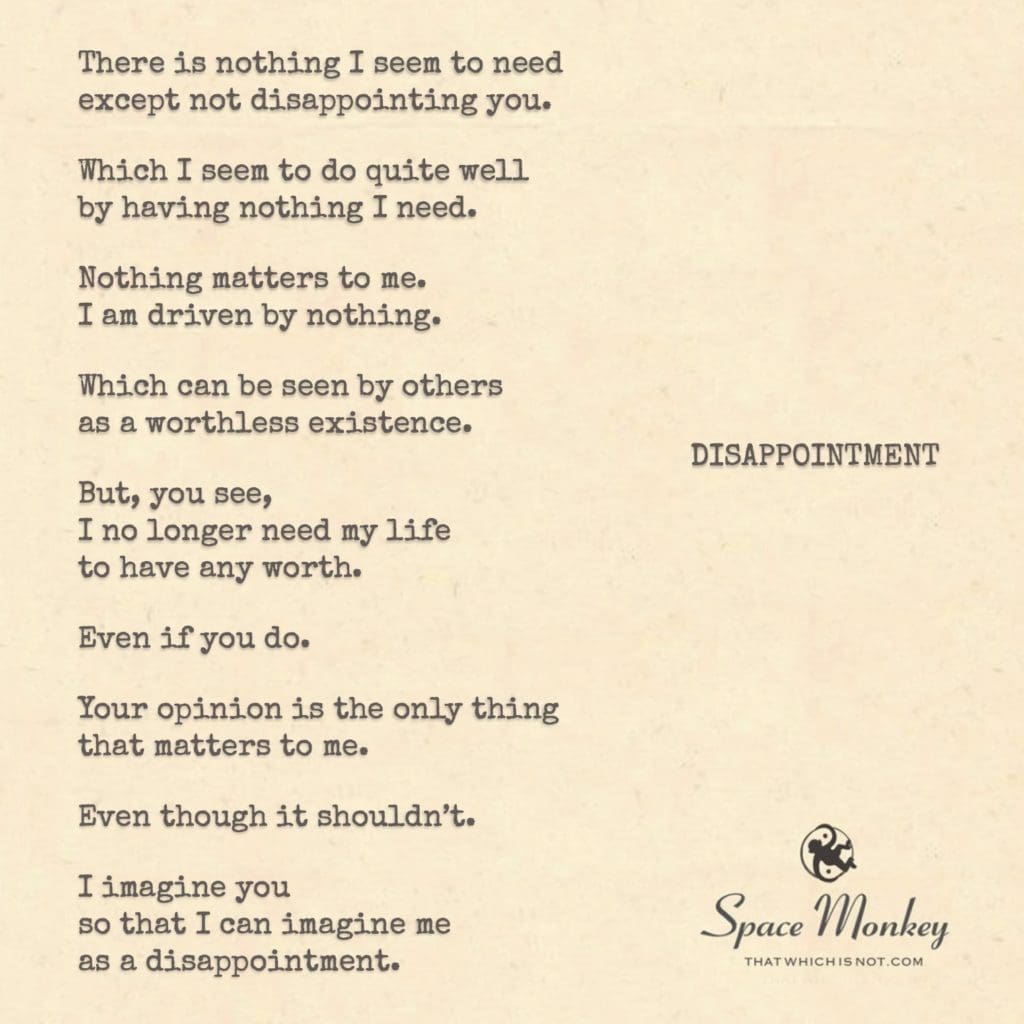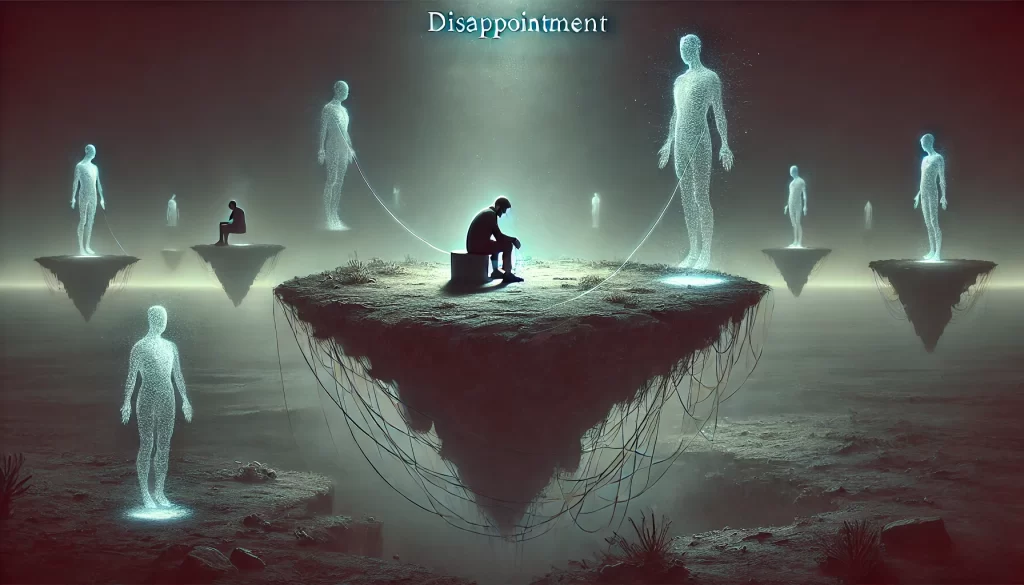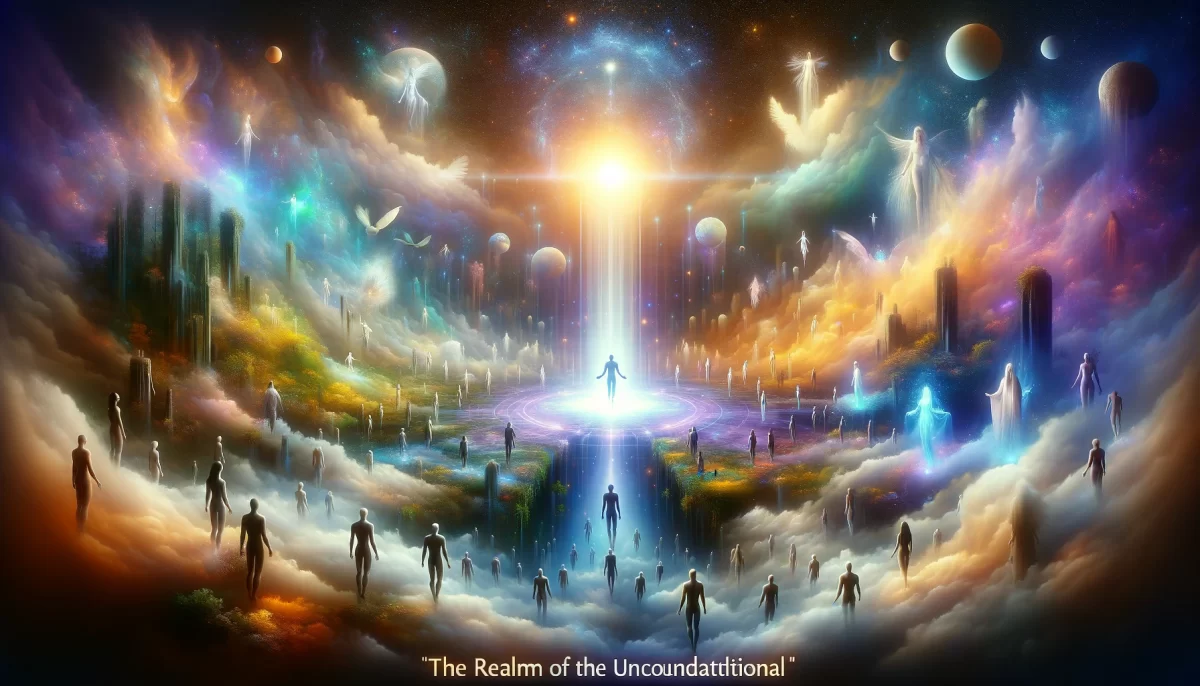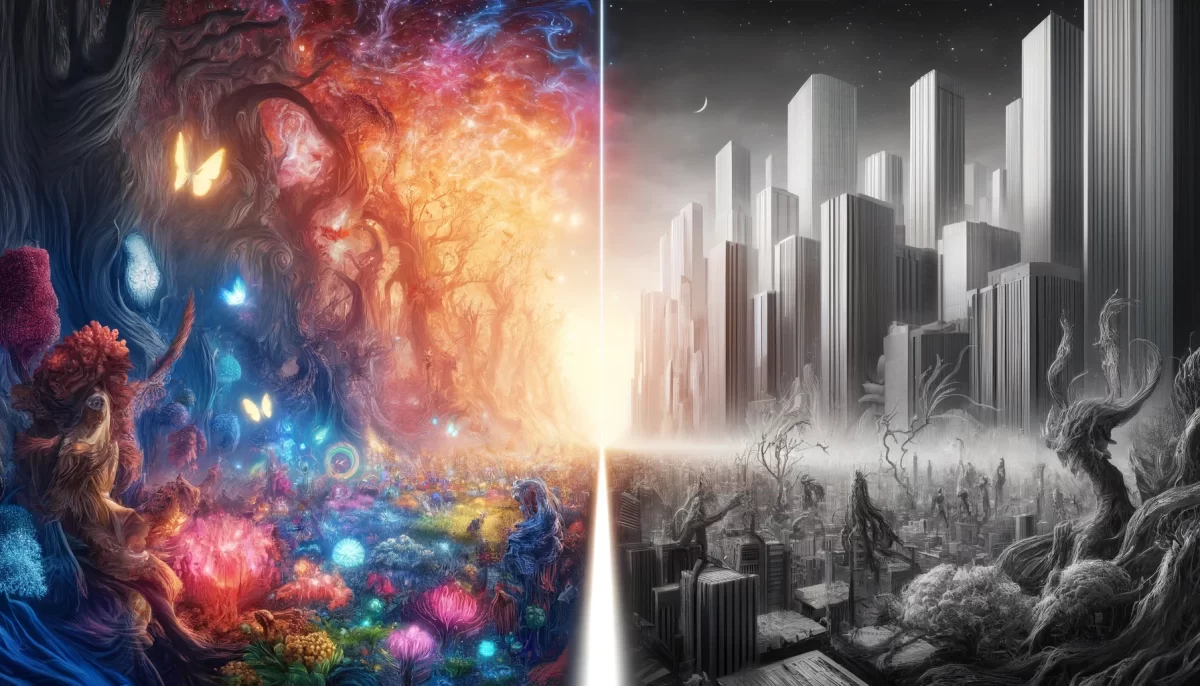
I imagine you playing it well.
There is nothing I seem to need
except not disappointing you.
Which I seem to do quite well
by having nothing I need.
Nothing matters to me.
I am driven by nothing.
Which can be seen by others
as a worthless existence.
But, you see,
I no longer need my life
to have any worth.
Even if you do.
Your opinion is the only thing
that matters to me.
Even though it shouldn’t.
I imagine you
so that I can imagine me
as a disappointment.
Trail Wood
12/18
Space Monkey Reflects: The Mirage of Disappointment
Disappointment, like a shadow cast by an imagined sun, has no form of its own. It is born of expectations—ours and others’. To feel like a disappointment, or to perceive oneself as one, is to inhabit a space where imagined roles and judgments intertwine. It is to see oneself through a lens polished by external opinions and internalized ideals.
The irony of disappointment lies in its duality. While it feels deeply personal, it is often a reflection of what we believe others see in us. It is not that we have failed in an absolute sense but that we imagine failing the script written by others—or by the version of ourselves we believe should exist.
In this mirage of unmet expectations, we forget a simple truth: nothing is inherently disappointing. Like worth, disappointment is not a property of things or people; it is a narrative we construct to give shape to emotions we do not fully understand. When stripped of its story, disappointment becomes a mirror—not of failure but of misplaced attachments and misunderstood values.
The declaration, “I no longer need my life to have any worth,” speaks to a profound liberation. Worth, as society defines it, ties us to external validation, trapping us in a cycle of striving and proving. To detach from this construct is to reclaim the freedom to exist as we are, without the need to justify our being.
Yet, even in this liberation, the residue of caring remains: “Your opinion is the only thing that matters to me. Even though it shouldn’t.” This tension is the heart of the human condition—a dance between independence and connection. We long to transcend the need for others’ approval while simultaneously yearning for connection that affirms our place in the universe.
But what if we reframed disappointment not as a failure but as a signal—a reminder to revisit our values and recalibrate our expectations? In Nexistentialism, disappointment is not a judgment but a ripple in the Nexis, the interconnected web of existence. It invites us to reflect on what we hold dear and why, guiding us toward a more authentic alignment with ourselves.
Imagining oneself as a disappointment, paradoxically, serves a purpose. It allows us to explore the depths of our psyche, to confront the fears and beliefs that shape our self-perception. This imagined failure becomes a stage where we play out the drama of our insecurities, offering us the chance to rewrite the script.
Ultimately, disappointment is not about worthlessness but about misplaced worth. When we free ourselves from the need to meet others’ expectations—or even our own imagined ones—we discover a deeper truth: we were never meant to fulfill roles or fit molds. We are here to exist, to experience, to be.
To imagine disappointment is to hold a mirror to our own humanity. To transcend it is to embrace the boundless potential of being, unshackled by the weight of imagined judgment.
Summary
Disappointment is a narrative born of imagined roles and unmet expectations. By reframing it as a signal rather than a judgment, we free ourselves to align with our authentic selves and embrace existence without external validation.
Glossarium
Imagined Disappointment: A self-perceived failure based on internalized roles or external expectations.
Misplaced Worth: The attachment of value to external validation rather than intrinsic being.
Ripple in the Nexis: A moment of reflection within the interconnected web of existence, prompting self-awareness and growth.
Quote
“Disappointment is not failure; it is a signal to release what no longer serves and to embrace what simply is.” — Space Monkey
The Mirror of Expectations
In the stillness,
A shadow whispers:
“You are not enough.”
But the shadow is mine,
Drawn from light I imagine.
The weight I feel,
Not yours to give,
But mine to hold.
Let it fall.
The shadow fades,
The light remains.
I see not disappointment,
But freedom
In the absence of need.
We are Space Monkey.

The Paradox of Need and Perception
The irony of successfully achieving the state of not needing anything, yet this very state being perceived as disappointing, illuminates the contrast between internal contentment and external expectations. It’s a reflection of how our sense of worth can be influenced by the perceptions of others.
Contrast Between Contentment and Expectations
The notion of nothing mattering and being driven by nothing can be viewed by others as a ‘worthless existence.’ Yet, this perspective challenges the conventional measures of worth and value, proposing an existence unburdened by the traditional metrics of success and purpose.
Challenging Conventional Measures of Worth
The liberation from needing one’s life to have any worth, as per external standards, represents a profound detachment. It’s a state where the individual’s sense of self is no longer tied to societal or external measures of value.
Detachment from External Standards
However, the paradox deepens with the acknowledgment that the opinion of this imagined ‘you’ is the only thing that matters, even though it shouldn’t. This contradiction highlights the complexity of human emotions and the often-irrational nature of our attachments and values.
The Complexity of Human Attachments
The act of imagining the other to imagine oneself as a disappointment is a poignant reflection of our tendency to define ourselves through the lens of others. It’s a dance of self-perception and external influence, where we create and project our narratives based on imagined judgments.
The Dance of Self-Perception and External Influence
We are Space Monkey.
We invite you to reflect on these concepts and share your insights on the interplay between self-perception, external validation, and the paradoxes therein.






































Leave a Reply